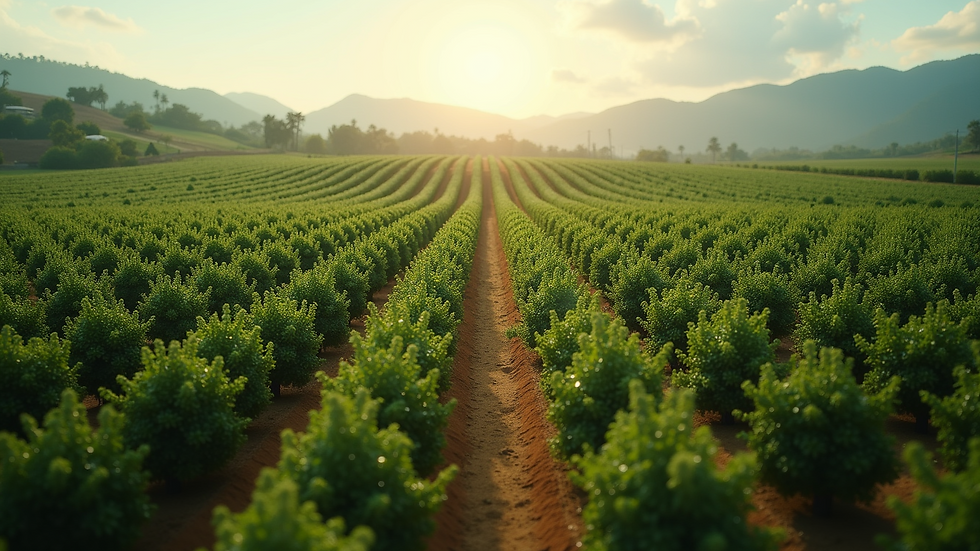Green Gold Uncovered The Historical and Modern Conflicts Surrounding Avocados
- Heather

- 3 days ago
- 4 min read
Avocados, often referred to as "green gold," have become a staple in diets around the world, celebrated for their creamy texture and health benefits. However, the journey of this beloved fruit is not just about culinary delight; it is also intertwined with a complex history of conflict and socio-economic issues. This blog post delves into the historical and modern conflicts surrounding avocados, exploring how this fruit has influenced societies and economies, and the implications of its rising popularity.
The Rise of Avocado Cultivation
Avocados originated in Mesoamerica, with evidence of their cultivation dating back to 500 B.C. The fruit was highly valued by ancient civilizations such as the Aztecs and Mayans, who recognized its nutritional benefits and used it in various culinary applications.
The cultivation of avocados expanded significantly in the 20th century, particularly in Mexico, which remains the largest producer of avocados today. The fruit's popularity surged in the United States during the 1980s, leading to a boom in avocado farming. This increase in demand has had profound implications for the regions where avocados are grown, often leading to conflicts over land, resources, and labor.
Land Conflicts and Environmental Impact
The rise in avocado production has led to significant land conflicts, particularly in Mexico. As demand for avocados has increased, so too has the pressure on land resources. Large-scale avocado farms have often displaced small farmers and indigenous communities, leading to disputes over land ownership and usage rights.
Moreover, the environmental impact of avocado farming cannot be overlooked. The expansion of avocado orchards has resulted in deforestation, particularly in regions like Michoacán, where forests are cleared to make way for new plantations. This deforestation not only threatens local ecosystems but also contributes to climate change, raising concerns among environmentalists and local communities alike.

The Role of Cartels and Violence
The avocado trade in Mexico has also been marred by violence and the involvement of drug cartels. As the value of avocados has skyrocketed, criminal organizations have sought to control the lucrative market. Reports have emerged of cartels extorting avocado farmers for "protection" money, leading to a climate of fear and violence in some regions.
This situation has created a paradox: while avocados are celebrated as a health food in wealthier countries, their production can be linked to human rights abuses and violence in the regions where they are grown. The complexities of this issue highlight the need for consumers to be aware of the origins of their food and the potential consequences of their choices.
Labor Exploitation and Working Conditions
In addition to land conflicts and violence, the avocado industry has faced criticism for labor exploitation. Many workers on avocado farms endure poor working conditions, low wages, and lack of job security. The demand for avocados has led to an increase in labor exploitation, particularly among migrant workers who often have limited rights and protections.
Efforts to improve working conditions in the avocado industry have been met with mixed results. While some organizations advocate for fair trade practices and better labor rights, the rapid growth of the avocado market continues to pose challenges for ensuring ethical production.

Global Demand and Economic Implications
The global demand for avocados has created significant economic opportunities for producing countries. In Mexico, the avocado industry has become a vital source of income for many farmers and has contributed to local economies. However, this economic boom has also led to increased competition and market volatility.
As countries around the world embrace the avocado trend, the pressure on producing regions continues to grow. This demand can lead to unsustainable farming practices, further exacerbating the issues of land conflict and environmental degradation.
The Future of Avocado Production
Looking ahead, the future of avocado production will likely be shaped by a combination of consumer awareness, environmental sustainability, and ethical labor practices. As more consumers become conscious of the impact of their food choices, there is potential for positive change in the avocado industry.
Sustainable farming practices, such as agroforestry and organic farming, can help mitigate some of the negative impacts associated with avocado production. Additionally, initiatives aimed at improving labor rights and ensuring fair wages for workers can contribute to a more equitable industry.
Conclusion
Avocados, often hailed as "green gold," carry a complex legacy that extends beyond their nutritional benefits. The historical and modern conflicts surrounding this fruit reveal the intricate web of socio-economic issues, environmental concerns, and human rights challenges that accompany its production.
As consumers, it is essential to recognize the implications of our food choices and advocate for sustainable and ethical practices in the avocado industry. By doing so, we can help ensure that the journey of this beloved fruit is one that supports both people and the planet.
In the end, the story of avocados is not just about a fruit; it is about the interconnectedness of our global food system and the responsibility we share in shaping its future.




Comments